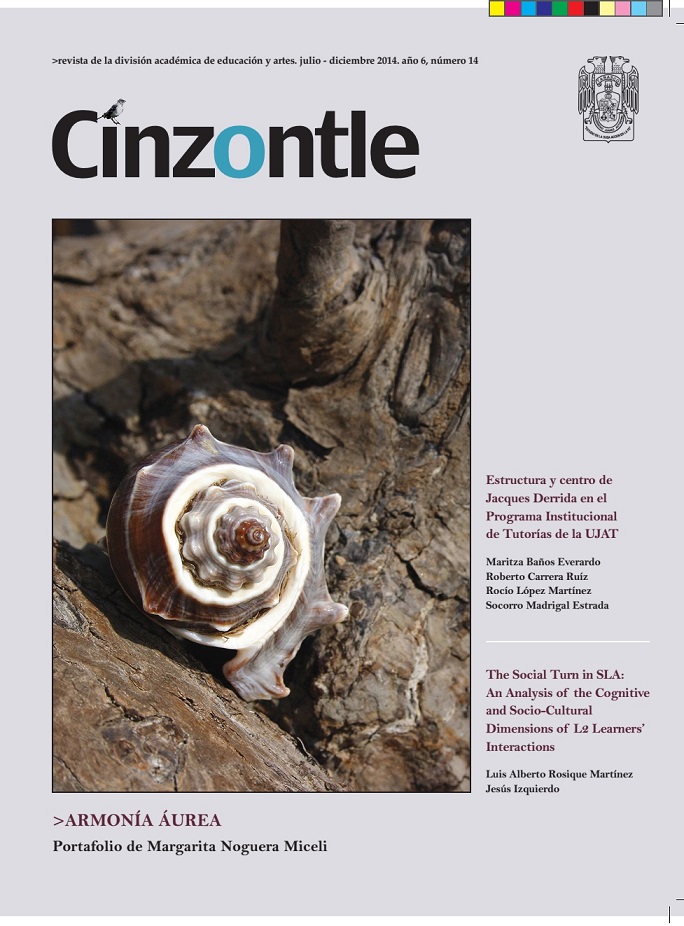The Social Turn in SLA: An Analysis of the Cognitive and Socio-Cultural Dimensions of L2 Learners’ Interactions
Resumen
The Social Turn in Second Language Acquisition (SLA) addresses the importance of social context in language development. Building upon this theoretical strand, this small-scale research examines the dyadic interaction of university Mexican learners of English in a problem-solving task through a socio-cultural model of analysis. The interactional analysis of learner performance revealed that, along with linguistic attention, ideology, identity and affective scaffolding arose during the information exchange. In line with claims from the socio-cultural strand of SLA, we argue that these features created interactional conditions that allowed for successful communication in the target language and task completion.Referencias
- Block, D. (1996). Not so fast: some thoughts on theory culling, relativism, accepted findings and the heart and soul of SLA. Applied Linguistics.17, 63-83.
- Block, D. (2003). The social turn in second language acquisition. Washington, DC: Georgetown University Press.
- Council of Europe. (2001). Common European Framework of Reference for Languages: Learning, teaching, assessment. Cambridge, UK: Cambridge University Press.
- Dewey, J. (1938). Experience and education. New York: Macmillan.
- Dewey, J. (1980). The need for social psychology. In J.A. Boydston (Ed.), John Dewey: middle works, 1899-1924 (Vol. 10, pp.53-63). Carbondale, IL: Southern Illinois University. (Orginal work published 1916).
- Donato, R. (1994). Collective scaffolding in second language learning in P. Lantolf and G. Appel (eds): Vygotskian Approaches to Second Language Research. Norwood, NJ: Ablex.
- Duff, P.A. & Talmy, S. (2011). Language Socialization Approaches to Second Language Acquisition. Social, Cultural, and Linguistic Development in Additional Languages. In Atkinson, D. (2011). Alternative approaches to second language acquisition (pp. 95-116). New York, NY: Routledge.
- Firth, A. & Wagner, J. (2007). Second/Foreign Language Learning as a Social Accomplishment: Elaborations on a Reconceptualized SLA. The Modern Language Journal, 91, 800-819.
- Gánem, A. (2008). Microgenesis, Method and Object: A Study of Collaborative Activity in a Spanish as a Foreign Language Classroom. Applied Linguistics. Oxford Journals, 29, 120-148.
- Kant, E. (1987). The collected works of L. S. Vygotsky, volume 1: Problems of general psychology. R. Reiber & A. Carton (Eds.), New York: Plenum Press.
- Lantolf, J. & Thorne, S.L. (2007). Sociocultural Theory and Second Language Learning. In Van Patten, B. & Williams, J. (2007). Theories in Second Language Acquisition. (pp. 201-224). New York, NY: Routledge.
- Lantolf, J. (2006). Language Emergence: Implications for Applied Linguistics-A so-ciocultural perspective. Applied Linguistics. Oxford Journals, 27, 717-728.
- Lawler, E.J. (2001). An Affect Theory of Social Exchange. The American Journal of Sociology, 107, 321-352.
- Lawler, E. J., & Thye S.R. (1999). Bringing Emotions into Social Exchange Theory. An-nual Review of Sociology, 25, 217-244.
- Ortega, L. (2009) Understanding Second Language Acquisition. New York, NY: Rout-ledge.
- Mackey, A., & Gass, S. M. (2005). Second Language Research: Methodology and Design. New York: Routledge. Mahwah, NJ: Erl-baum.
- Pierce, B.N. (1995). Social identity, invest-ment, and language learning. TESOL Quar-terly, 29, 9-31.
- Roschelle, J. & Teasley, S. D. (1995). The construction of shared knowledge in collabora-tive problem solving. In C. O’Malley (Ed.). Computer Supported Collaborative Learn-ing. Berlin, Germany: Springer-Verlag. - Swain, M. & Deters, P. (2007). New Main-stream SLA Theory: Expanded and Enriched. The Modern Language Journal, 91, 820-836.
- Swain, M. & Lapkin S. (1995). Problems in output and the cognitive processes they gen-erate: A step towards second language learning. Applied Linguistics, 16, 371–391.
- Swain, M. & Lapkin, S. (2001). Focus on form through collaborative dialogue: Exploring task effects. In M. Bygate, P. Skehan and M. –
- Swain (Eds): Researching Pedagogic Tasks: Second Language Learning, Teaching and Testing (pp. 99–118). London, UK: Longman.
- Swain, M. (1997). Collaborative dialogue: Its contribution to second language learning. Revista Canaria de Estudios Ingleses, 34, 115–332.
- Vygotsky (1987). The collected works of L. S. Vygotsky, volume 1: Problems of general psychology. R. Reiber & A. Carton (Eds.), New York: Plenum Press.
- Wood, D., Bruner, J., & Ross, G. (1976). The role of tutoring in problem-solving. Journal of Child Psychology and Psychiatry, 17, 89–100.


